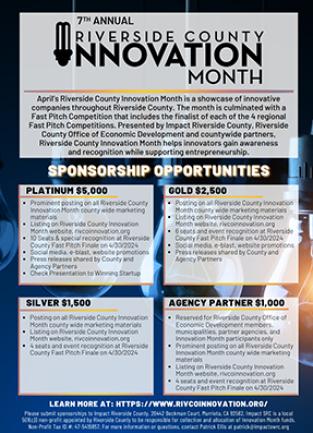The Innovative Push within Riverside County
March 28, 2023
The Innovative Push within Riverside County
When the California Air Resources Board (CARB) opened its highly anticipated headquarters in Riverside County in 2021, it captured the attention of visionaries and innovators from across the country. The state-of-the-art facility, complete with laboratory space, an advanced chemistry area and vehicle test cells, will support California’s zero-emission goals and help transform the State’s transportation systems. The new CARB campus takes its place as one of the premier vehicle emissions testing facilities in the world.
CARB is a critical node for innovation throughout the state of California, but it is also a beacon of the emerging technology ecosystem in Riverside County. The region has a growing network of innovation centers and incubators that support dozens of start-ups in a wide range of fields, from clean tech and biotech to agricultural tech, and tremendous support from local governments, universities, and industry stakeholders who are committed to seeing Riverside County become a thriving and self-sustaining technology hub.
Technology Landscape
When Jay Goth, John Powers, and Brandon Young partnered to start a genomics sequencing lab, it was easy to decide on a location. Goth and Young both live in Riverside County, and recognizing the opportunity within the county, chose a location here, and opened Murrieta Genomics at the city-supported Innovation Center. The county is home to a healthy pool of C-suite executives that commute to coastal markets for tech-related jobs; however, start-ups are finding a long list of benefits in the region, including attractive real estate costs and government and community support. Together, these benefits have lured technology entrepreneurs to the market.
“We really liked the fact that the City of Murrieta is very pro-active in trying to attract businesses into the Innovation Center, and there was a financial incentive because the cost of rent is very low,” said Goth, a founding member of the company.
Murrieta Genomics is a model example of the expanding biotech market in Riverside County. The company is one of only two genomics start-up incubators in the country, and it currently has 12 start-up biotech companies under its wing, all of which show real promise of success. Goth says the lab is just gaining momentum. “Our goal is to build companies here from the beginning. I believe that the technology base for life sciences is going to continue to grow,” he says, adding that the lab has received a lot of interest from foreign start-ups looking to expand into the US. “I think this could be another factor that will push the region forward.”
The biotech industry is one of several budding technology subindustries to see substantial growth in recent years. There is a real renaissance blossoming in the region, which is now home to hundreds of companies across various tech sectors—biotech, clean energy/climate tech, and agricultural and engineering technologies are leading the way. There are innovators like crop optimization company Vinduino, which can save farmers substantially by managing changing climate conditions; HNO Hydrogen Generators, an after-market hydrogen system that can immediately reduce global diesel exhaust gas emissions; and TRIO Pharmaceuticals, a cancer immunotherapeutic company developing dual action drugs. This is just a sampling of the start-up community evolving in Riverside County.
Like Murrieta Genomics, many of these companies have leveraged support from Riverside County’s innovation and accelerator programs. Vinduino works with the City of Temecula supported Temecula Valley Entrepreneurs Exchange, and EV Enterprises is growing under the Coachella Valley Economic Partnership and Palm Springs iHub. EV Enterprises is a producer of lithium-ion battery components, microelectronic & other related products for electric vehicle applications and more. “Through the CVEP/iHub we received mentoring, introduction to contacts and funding,” says Bill Schlanger, president of EV Enterprises. “The City of Palm Springs has a facility for start-ups that has been a great location for us.”
The University of California, Riverside plays an important role in driving this growth through a network of incubator, accelerator, and advisory services. CE-CERT, OASIS and SCEIN support clean tech developments; EPIC-Small Business Development Center provides support to early-stage start-ups, helping entrepreneurs in the program to secure nearly $35 million in the last two years; and ExCITE works closely with high tech and science start-up companies. “These are a key part of the puzzle,” says Martin Kleckner, Director of EPIC-SBDC at UCR. “We are identifying more and more viable companies than ever before.”
Laying the Seeds for Growth
Riverside County’s tech industry is expected to grow tremendously over the next decade. According to EMSI, these technology companies will add 100,000 jobs in Riverside County by 2030, a growth rate of 16% from 2020—and there is plenty of talent to fill them.
Residents in Riverside County have access to 17 colleges and universities that provide a deep well of talent for start-ups. Reinier van der Lee, the CEO of Vinduino, for example, has received hundreds of applications in response to job postings, illustrating, as he puts it, that access to high-level talent is “not a problem.” This talent pool is critical to fueling the sector’s growth over the next decade.
Infrastructure is also important to the region’s tech-growth story. Riverside County already has a foundation of quality lab and testing facilities. In the clean tech sector, Kleckner says the county’s test beds are second to none and are used to support both start-ups and established companies. These facilities often come at a considerable discount to the coastal markets as well. Office space in Los Angeles currently costs $3.52 per square foot. Inland Empire rents are a fraction of that cost at $2.05 per square foot.
The county’s tech stakeholders are pushing for more. Murrieta’s Innovation Center is expanding to include a wet lab, and Goth is in active discussions with developers to build out facilities to accommodate companies as they graduate from the start-up phase. “When you have a nice facility, that attracts a lot more people,” says Goth, adding that he has gotten a lot of interest from developers. “My vision is to grow the Murrieta area into a built-out R&D hub, similar to what they have done in San Diego that will focus on particular aspects of life science,” says Goth.
Industry stakeholders are also building internal capital sources to fund promising projects. Funding can often be the biggest challenge for these companies, and at present, 98% of funding is coming from outside of the market. Martin Kleckner and team launched Riverside Angels Summit Investors to pool capital from high-net worth individuals from within the county. “At a certain point, you want your region to see the benefits of these start-ups and not see all of the money go outside of the area,” says Kleckner. “We have good deal flow here.” They are currently working to secure more than $23 million in funding for 11 different companies in Riverside County. In Murrieta, the Innovation Center is also focusing on education, with seminars on topics like R&D tax credits and how to pitch an investor.
The last element of this landscape is community and government support, and it is just as integral as the others. Many CEOs praise the strong support from both the county and local cities, and the sense of community in the region. In many instances, governments also provided office or lab space at a reduced cost to support the technology sector. “This is an investment on the part of the city. It is critical,” says Goth. “I think that is what is really going to drive this—that sense of community and interactivity.”
In the next decade, the Riverside County region will be a significant new technology market with mature, growing and early-stage start-ups, but that foundation is being laid today. It’s a shared goal everyone in the County is working toward.






